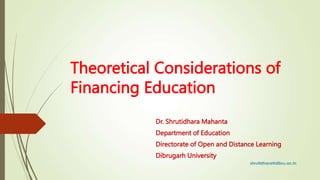
Theoretical Considerations of Financing Education.ppt
- 1. Theoretical Considerations of Financing Education Dr. Shrutidhara Mahanta Department of Education Directorate of Open and Distance Learning Dibrugarh University
- 2. Theoretical Considerations of Financing Education Financing education is a complex and multifaceted issue that has get significant attention from scholars, policymakers, and economists. Theoretical considerations in this realm are essential for understanding the principles and strategies behind funding the education system effectively. Few key theoretical perspectives are briefly discussed in the following points: 1. Public Goods Theory: According to this theory, education possesses characteristics of a public good. Public goods are non-excludable and non-rival goods, meaning that one person's education does not weaken the benefits available to others. This perspective justifies government intervention and public funding for education to ensure equitable access and promote societal well-being. This theory was developed by economists such as Paul Samuelson.
- 3. Theoretical Considerations of Financing Education 2. Human Capital Theory : Developed by economists like Gary Becker, the Human Capital Theory suggests that education is an investment in human capital. According to this theory, individuals and societies allocate resources to education with the expectation that it will yield returns in the form of increased productivity, higher income, and overall economic growth. From a financing perspective, this theory justifies government involvement in education as a means to enhance the overall skill level and productivity of the workforce. 3. Equity and Social Justice: Theories of equity and social justice highlight the importance of equal educational opportunities for all individuals, regardless of their socioeconomic background. These theories argue that education should be funded in a way that reduces disparities and ensures that marginalized and disadvantaged groups have access to quality education. 4. Investment in Future Generations: Financing education is often viewed as an intergenerational investment. Current generations invest in education to secure the future prosperity of society. This perspective underscores the importance of balancing immediate budgetary concerns with the long-term benefits that accrue from a well-educated population.
- 4. Theoretical Considerations of Financing Education 5. Fiscal Policy and Efficiency: From a fiscal perspective, the financing of education is intricately linked to government budgetary considerations. Theories related to fiscal policy emphasize the need for efficient allocation of resources in education. This includes considerations of cost- effectiveness, the role of competition, and the design of funding mechanisms to optimize the return on investment in education. 6. Efficiency and Allocation of Resources: Economists stress the importance of efficient allocation of resources in education financing. Scarce resources must be allocated to maximize educational outcomes. Cost-benefit analyses and resource allocation models help policymakers to make appropriate decisions regarding distribution of funds effectively. 7. Globalization and Knowledge Economy: In today's globalized world and knowledge-based economy, education financing is influenced by the need to remain competitive on a global perspective. Countries invest in education to nurture innovation, technological advancement, and global workforce readiness among the populace. 8. Political Economy: The political economy perspective emphasizes that education financing decisions are shaped by political interests and power dynamics. Policymakers must navigate the complex chemistry of competing interests and ideologies when making decisions about financing education.
- 5. Theoretical Considerations of Financing Education 9. Market-Based Approaches: Some theories advocate for market-oriented approaches to education financing. They suggest that competition and choice can lead to improvements in educational quality and efficiency. 10. Externalities and Spillover Effects: Education is often associated with positive externalities, where the benefits extend beyond the individual learner. For example, an educated workforce can drive innovation and economic growth. Theoretical considerations in this context stress the need for policies that capture these spillover effects in funding decisions. In practice, the financing of education often involves a blend of these theoretical considerations, and the specific approach varies from one country or region to another. The challenge lies in finding the right balance between public and private financing, addressing equity concerns, and ensuring that educational investments align with broader societal goals. A holistic approach to financing education takes into account these various theories and strives to strike a balance between economic efficiency, social justice, and the promotion of human capital development in a rapidly changing world. Ultimately, the goal is to ensure that education remains accessible, equitable, and relevant to the needs of individuals and society as a whole.